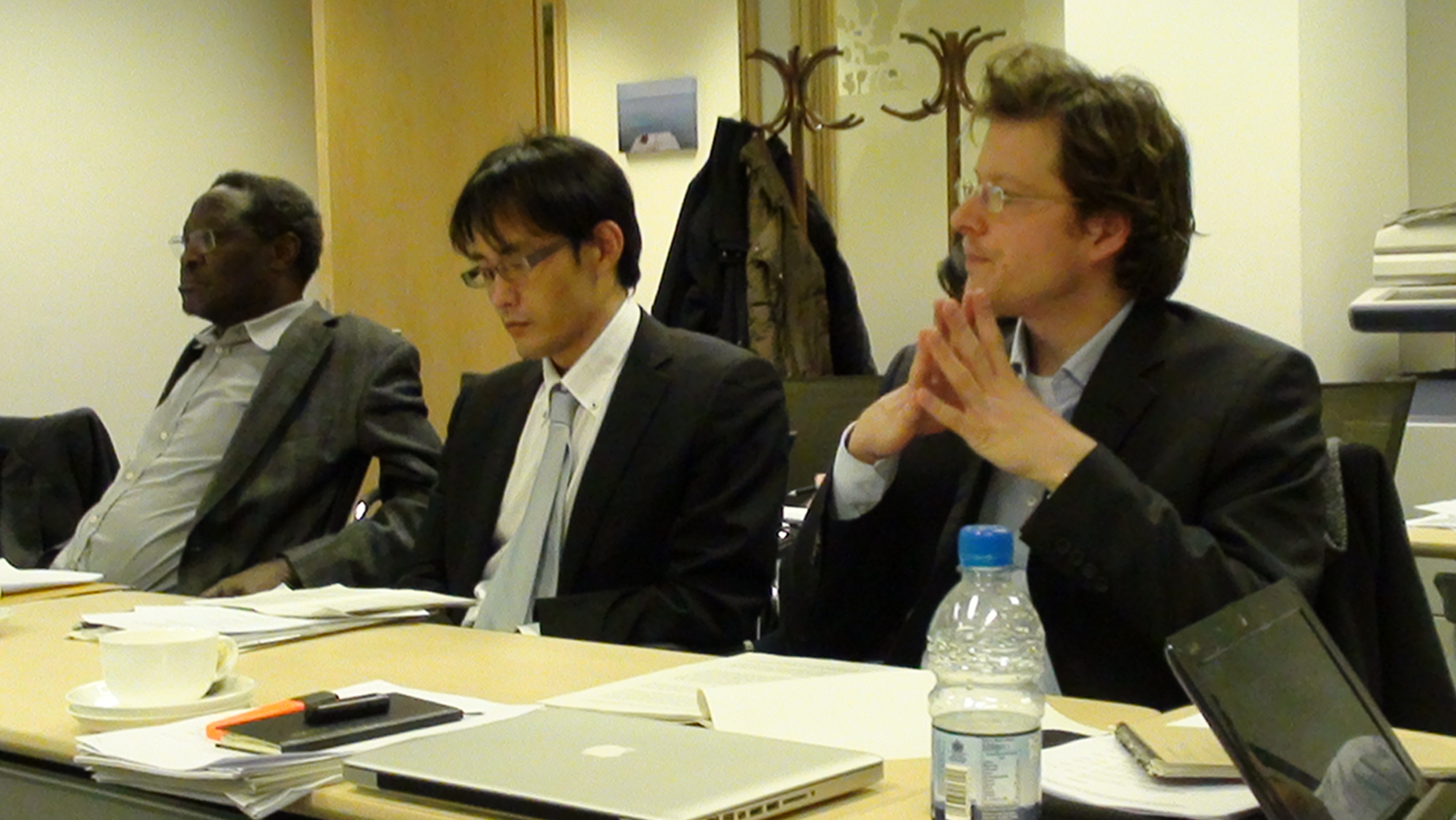Workshop on Conflict Prevention in Africa Held in London
2011.04.22
JICA-RI held a workshop on the research project "Prevention of Violent Conflict in Africa: The Roles of Development Cooperation" at JICA's London Office on March 15-16, 2011. The workshop, attended by the research team leader Yoichi Mine and their advisors, was organized with the aim to discuss the progress of the research and compile the outcomes.
Among the participants were nine research members -- JICA-RI visiting fellow Yoichi Mine, senior research fellows Shinichi Takeuchi and Yuichi Sasaoka, research fellows Satoru Mikami and Mari Katayanagi, and four researchers from outside institutions. With other three advisors, the attendees engaged in intense discussions to brush up on each study.

(center) Satoru Mikami
at JICA Office in London
The objective of this research project is to explore the mechanisms leading to violent conflict in Africa and to explore what kinds of institutions are effective in preventing it. The members have begun the research by conducting surveys to look into "horizontal inequalities" (inequality between different groups living in a same country), "political institutions" (particularly the degree of centralization or decentralization of power) and "people's perceptions" (people's identity and existence of the sense of hostility) in ten African countries. They are to integrate these three factors to examine the interface (a critical point of intersection between different elements) between the structures (socio-economic causes) and the processes (political causes) that lead to violent conflicts.
This workshop presented findings from comparative studies such as South Africa and Zimbabwe (Mine), Rwanda and Burundi (Takeuchi), and Uganda and Tanzania (Sasaoka).
Mikami, who specializes in quantitative analysis, focused on five African countries and made a presentation on whether socio-economic inequality exists between main ethnic groups and other groups, and how each ethnic group views it.
For example, comparing two ethnic groups Shona and Ndebele in Zimbabwe, a survey showed that the Ndebeles feel economically deprived, although no significant economic gap was confirmed in a family budget survey. In Nigeria, the Hausa-Fulani people in the Northern are believed to be poorer than the Yorubas and the Igbos in the south. However, a survey revealed that the Hausa-Fulanis do not necessarily think the same about themselves.
“After Zimbabwe became independent, the Shonas suppressed the Ndebeles. Since then, the Ndebeles have lost their political power and been deprived of chances to have their voices heard in politics. This feeling of deprivation could have affected the result of the survey,” Mikami explains of the seemingly contradicting result. As for the Nigerian case, he says "The Hausa-Fulanis occupy relatively important political positions in Nigeria, and this may be one explanation." "In other words, the real state of economic disparity is not always reflected in people's perceptions. It is likely that the aspect of political equality largely affects the perception of economic disparity as well," Mikami adds.
Following the presentations, the participants discussed their findings so far, such as how pairing similar countries and comparing them helped illustrate the differences in each country, and how detailed and intriguing results were being collected from the perception survey. Consequently they confirmed the progress of the overall project.
The research team aims to finalize a paper by fall 2011 and the outputs based on this paper will be published as an English book in 2012. Mine says “We have experienced a lot of difficulties in reaching this far. Especially it was hard to conduct surveys in politically unstable countries. I hope our research findings will contribute in connecting conflict prevention and development together, and be utilized in field operations of international cooperation.”
Related Research Area: Peace and Development
JICA-RI Research Program Div.
TEL: +81-(0)3-3269-2357 FAX: +81-(0)3-3269-2054

事業事前評価表(地球規模課題対応国際科学技術協力(SATREPS)).国際協力機構 地球環境部 . 防災第一チーム. 1.案件名.国 名: フィリピン共和国.

事業事前評価表(地球規模課題対応国際科学技術協力(SATREPS)).国際協力機構 地球環境部 . 防災第一チーム. 1.案件名.国 名: フィリピン共和国.

事業事前評価表(地球規模課題対応国際科学技術協力(SATREPS)).国際協力機構 地球環境部 . 防災第一チーム. 1.案件名.国 名: フィリピン共和国.

事業事前評価表(地球規模課題対応国際科学技術協力(SATREPS)).国際協力機構 地球環境部 . 防災第一チーム. 1.案件名.国 名: フィリピン共和国.

事業事前評価表(地球規模課題対応国際科学技術協力(SATREPS)).国際協力機構 地球環境部 . 防災第一チーム. 1.案件名.国 名: フィリピン共和国.
scroll